Welcome back to This Week in Apps, the Extra Crunch series that recaps the latest OS news, the applications they support and the money that flows through it all.
The app industry is as hot as ever with a record 204 billion downloads in 2019 and $120 billion in consumer spending in 2019, according to App Annie’s recently released “State of Mobile” annual report. People are now spending 3 hours and 40 minutes per day using apps, rivaling TV. Apps aren’t just a way to pass idle hours — they’re a big business. In 2019, mobile-first companies had a combined $544 billion valuation, 6.5x higher than those without a mobile focus.
In this Extra Crunch series, we help you keep up with the latest news from the world of apps, delivered on a weekly basis.
This week, Apple released earnings and gave us hints about the power of its wearables market. Congress as begun investigating top dating apps. Google’s App Maker announced a shutdown is coming. The iPad turned 10 and people discussed where it’s going wrong.
We also take a look at Byte, the so-called Vine reboot. I’m not impressed. Not only did Byte launch with a comment spam problem, including pornbots, it’s also heavily filled with adult and sometimes dark humor. This includes videos featuring dick jokes, sex toys, drugs and jokes about child abuse, despite a 12+ age rating and many users who appear to be children.
Headlines
Apple reports blockbuster earnings, details the growth of wearables
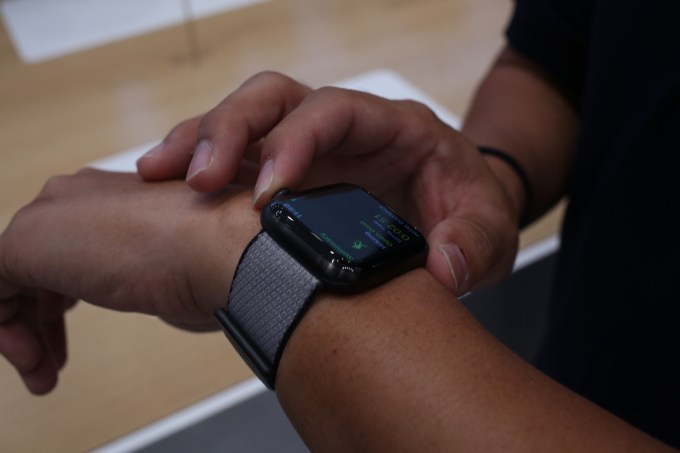 Apple’s shares spiked this week following record earnings that beat both its own guidance and Wall Street’s expectations. The company’s revenue totaled $91.8 billion, ahead of a predicted $88.43 billion. Earnings per share of $4.99 were also higher than the $4.54 predicted. Although Apple is steadily moving into the services space, its hardware business — led by iPhone — is what’s driving earnings. iPhone revenue was up 8% to $55.96 billion, thanks to new models. iPad revenue was $6B and Mac revenue was $7.2B. Of note, Apple’s “Wearables, Home & Accessories,” which includes Apple Watch and Airpods, is bigger than either iPad or Mac and set all-time records in the quarter, thanks to holiday giving.
Apple’s shares spiked this week following record earnings that beat both its own guidance and Wall Street’s expectations. The company’s revenue totaled $91.8 billion, ahead of a predicted $88.43 billion. Earnings per share of $4.99 were also higher than the $4.54 predicted. Although Apple is steadily moving into the services space, its hardware business — led by iPhone — is what’s driving earnings. iPhone revenue was up 8% to $55.96 billion, thanks to new models. iPad revenue was $6B and Mac revenue was $7.2B. Of note, Apple’s “Wearables, Home & Accessories,” which includes Apple Watch and Airpods, is bigger than either iPad or Mac and set all-time records in the quarter, thanks to holiday giving.
Apple Watch as an app platform hasn’t quite taken off the way the iOS App Store has, but the market is still young. CEO Tim Cook said this week that the revenue for the wearables category within “Wearables, Home & Accessories” grew 44% in the quarter. Also, Apple Watch hasn’t at all reached market saturation.
“[With] Apple Watch in particular, 75% of customers are new to the Apple Watch,” Cook said. “It’s still very much selling to new customers at this point.”
Vine gets rebooted as Byte, then gets spammed
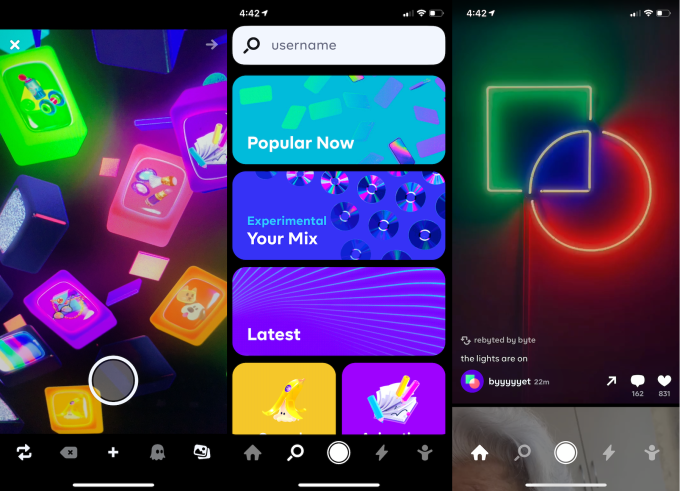 Twitter bought short-form video app Vine and then made the colossally bad decision to shut it down. Now we’re all using the Chinese app TikTok instead, when Vine could have run away with the short-form video market — at least in the U.S. Now Vine’s co-founder Dom Hofmann hopes to recapture Vine’s magic with his new app, Byte. But unlike TikTok, which allows for one-minute long clips, Byte videos can only be 6 seconds. The company’s goal is to attract creators by offering them a way to monetize through a partner program, ad rev shares, tipping and more. Making money, meanwhile, isn’t something TikTok has mastered despite its huge install base. TikTok has seen 1.65 billion downloads to date, but the app only grossed $176.9 million in 2019.
Twitter bought short-form video app Vine and then made the colossally bad decision to shut it down. Now we’re all using the Chinese app TikTok instead, when Vine could have run away with the short-form video market — at least in the U.S. Now Vine’s co-founder Dom Hofmann hopes to recapture Vine’s magic with his new app, Byte. But unlike TikTok, which allows for one-minute long clips, Byte videos can only be 6 seconds. The company’s goal is to attract creators by offering them a way to monetize through a partner program, ad rev shares, tipping and more. Making money, meanwhile, isn’t something TikTok has mastered despite its huge install base. TikTok has seen 1.65 billion downloads to date, but the app only grossed $176.9 million in 2019.
But Byte got off to a rough start. The app immediately saw massive comment spam as bots rushed to fill comment sections with follow requests (and follow for follows), including pornbots. (Hey it’s just like Vine!) People also started snatching up coveted usernames — those belonging to real people, ranging from tech folks to celebs like Taylor Swift and other prominent figures like Trump, Bezos, Tiger Woods and others.
Despite its issues, Byte saw over 700,000 total downloads since Friday’s launch through this Tuesday, according to App Annie. Sensor Tower believes it’s topped 1M now. But whether those downloads turn into active users and whether Byte has staying power remains to be seen.
Byte review: YIKES
I’m not sold on Byte. Recapturing the spirit of Vine may not be that easy to do so many years later. I also didn’t find many of the “popular” videos compelling, as they included recycled TikTok content (with the logo showing!), Snapchat videos, stolen FunnyorDie content, clips of videos from YouTube and other sources and recycled video memes.
There was a lot of adult humor, too, right in the main feed, including one joke about incest, another comparing a hat to a giant condom, among several other dick jokes.
In one, a (teenaged?) boy jokes, “if you call me a slut in the comments one more time, I’m going to suck all your d***s.” Another teen jokes about a prostate exam performed by his dad. In another, a drone tries to fly a dildo into a blow-up doll. One video made light of child abuse, showing a man viciously hitting the phone screen from above (so you feel like you’re the child) with a video description that reads: “when a child brings up a valid argument.”
Another video showed a dad knocking a toddler down, seemingly on purpose, while they played ball. A different video depicted someone spraying a toddler with a kitchen sink nozzle, making the baby cry. One video made fun of Chinese people dying from coronavirus. Another shows a young person smoking a joint beneath a bridge, hearing a siren and running. In another, a teen asks if anyone had pooped into someone else’s…wait never mind, I’ll stop now. You get the point.
I felt uncomfortable watching a lot of Byte’s content.
I realize I’m not the humor police — if crass, offensive and dumb is your jam, feel free. (I mean, don’t hurt your kids for likes, though.) But much of Byte’s content was wildly inappropriate for an app with 12+ age-rating.
And that age rating isn’t being enforced. There were minors — tweens at best — making videos on Byte and publishing them publicly.
TikTok isn’t squeaky clean! I get it. But this sort of stuff just doesn’t get surfaced in TikTok’s main feed by default, nor is it encouraged. Instead, TikTok features creators dancing and doing tricks; pulling in their parents, classmates and teachers to do videos with them; or showing off their creativity, skills, and humor. In the fringes, TikTok also has users who post hate speech and the app has creeps leaving comments at times. It may even be engaging in censorship. These are frightening and terrible things, too. But on TikTok, users have to seek out the obscene and the awful, it doesn’t just appear on the For You page — unless you’ve trained the app to show you that sort of thing by way of your follows and watch history.
Byte should at the very least not be rated for kids.
And it needs to do a better job showcasing the type of humor and fun it wants on the app, which surely can’t be some of the crap I just watched.
Dating apps under congressional investigation
![]() Following reports of sex offenders using dating apps like Tinder and others, a U.S. House subcommittee is now investigating popular dating apps for allowing minors and sex offenders to use their services, the AP reported. Current targets of the investigation include Bumble, Grindr and apps from the Meet Group and Match Group (Tinder, Match, OKC, PoF, Hinge, and others). The subcommittee asked the companies to detail their procedures and share what complaints they’ve received related to assaults. Seemingly in hopes of heading off this sort of issue, Match Group announced last week in invested in safety app Noonlight and was integrating its features into Tinder and others. That way, they get to tell Congress they have a solution and they’re rolling it out. But they’re not running background checks across all apps, so the problem isn’t going to be solved.
Following reports of sex offenders using dating apps like Tinder and others, a U.S. House subcommittee is now investigating popular dating apps for allowing minors and sex offenders to use their services, the AP reported. Current targets of the investigation include Bumble, Grindr and apps from the Meet Group and Match Group (Tinder, Match, OKC, PoF, Hinge, and others). The subcommittee asked the companies to detail their procedures and share what complaints they’ve received related to assaults. Seemingly in hopes of heading off this sort of issue, Match Group announced last week in invested in safety app Noonlight and was integrating its features into Tinder and others. That way, they get to tell Congress they have a solution and they’re rolling it out. But they’re not running background checks across all apps, so the problem isn’t going to be solved.
Self-care apps are raking it in
ICYMI TechCrunch this week:
The millennial obsession with wellness and self-care has led to a booming business for meditation apps. In the first quarter of 2018, app intelligence firm Sensor Tower reported the top 10 “self-care” apps had pulled in some $27 million in revenue. Fast-forward to the end of 2019, and the numbers have gotten much higher. According to Sensor Tower’s latest data, just the top 10 highest-grossing meditation apps of 2019 — a subset of “self-care” apps — grew to $195 million. That’s a 52% year-over-year increase.
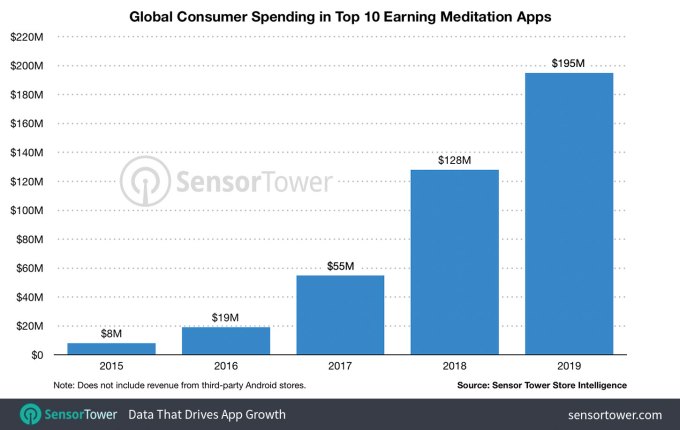
Calm, in particular, is killing it. The app is estimated to have grossed $92 million in 2019.
Read more here.
iOS 13 adoption reaches 70%
Apple never really has fragmentation issues, especially compared with Android. This week, iMore reported on Apple’s new iOS adoption numbers, noting that iOS 13 is now running on 70% of all devices and on 77% of all devices introduced in the last four years. In addition, 57% of all devices use the new iPadOS and 79% of all devices introduced in the last four years use iPadOS.
Meanwhile, iOS 14 is currently rumored to support the same set of devices as iOS 13.
Apple’s latest “Sherlock” appears to be a new Tile rival called AirTags
Tile’s concerns about Apple’s plan to introduce a lost-item tracker into iOS increasingly seem to be justified. According to the latest forecast from well-known Apple analyst Ming-Chi Kuo, Apple in the first half of 2020 will introduce ultra wideband tags that will work similarly to Tile, except that they promise greater accuracy than Bluetooth LE and Wi-Fi. Evidence of the tags was already found in iOS 13 code. Tile’s general counsel Kirsten Daru recently spoke out against Apple in a congressional hearing about Apple’s anti-competitive practices, comparing it to soccer: “You might be the best team in the league, but you’re playing against a team that owns the field, the ball, the stadium, and the entire league, and they can change the rules of the game at any time.”
An app that takes attendance raises privacy concerns
Here’s another signal that people no longer trust apps: an app designed to take attendance by way of Bluetooth beacons is meant to simplify the time-consuming attendance process. The app doesn’t use GPS, so it can’t track students wherever they go. But already controversy has erupted, as some believe such an app is invasive and raises privacy concerns.
In years past, this same issue may not have come up. Apps were seen as great solutions for things that used to be manual process, or used paper and pen. But today’s app users are warier. So many apps have now violated their privacy and leaked their data, many users’ first instinct is just to fight back.
Google App Maker to shut down
Citing low usage, Google says its low-code app development platform, Google App Maker, will shut down on Jan. 19, 2021. But the move isn’t really about reducing Google’s commitment to low-code apps. Instead, this news comes two weeks after Google acquired no-code app provider AppSheet, which is being integrated into Google Cloud. The new app dev platform allows customers to build apps that leverage Google’s other properties like Google Sheets, Forms and more.
Tesla app’s dark patterns lead to unintended purchases
The subscription model catches more victims of unintended purchases. This time, it was Tesla app users and big, big purchases. In Telsa’s case, the app was using dark patterns including default selections — like a $4,000+ software upgrade being added to the cart automatically and grayed-out text about there being no refunds for that purchase. Um, what? How is this allowed?
Dark patterns are only one problem with the subscription model. Others are questioning if the subscription model is even sustainable because there’s only so much users are willing to spend on apps on a monthly or annual basis. While it would be nice to only pay if you wanted to upgrade, part of the reason for subscriptions has to do with how quickly apps become out of date as Apple and Google upgrade their OS platforms. Still, a “lifetime” purchase option that eliminates the monthly bill would be nice.
Nintendo mobile games hit $1 billion in player spending
Nintendo took its time entering the mobile app stores, but it’s having a good run. Nintendo’s suite of mobile games have now generated more than a billion in lifetime revenue across the App Store and Google Play, says Sensor Tower. Most of that revenue — $656 million — comes from strategy RPG Fire Emblem Heroes. The next two highest-grossing titles were Animal Crossing: Pocket Camp, followed by Dragalia Lost. Popular titles like Mario Kart Tour, Super Mario Run and Dr. Mario World, deliver little revenue, at 8%, 7% and 1% respectively.
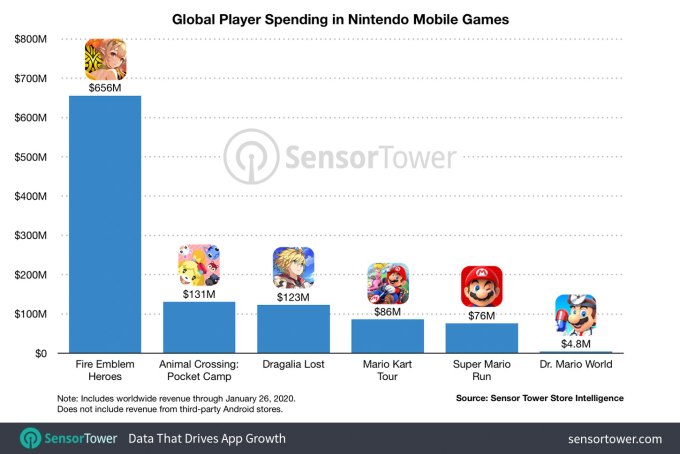
Happy Birthday, iPad?
It’s the iPad’s 10th birthday and people celebrated by…dissing the iPad.
- John Gruber is disappointed with the iPad, saying the iPad hasn’t come close to living up to its potential — the hardware is great, but the software is not. “iPadOS’s ‘multitasking’ model is far more capable than the iPhone’s, yes, but somehow Apple has painted it into a corner in which it is far less consistent and coherent than the Mac’s, while also being far less capable,” said Gruber. “iPad multitasking: more complex, less powerful. That’s quite a combination.”
- Stratechery calls it “the tragic iPad” and agrees with Guber that multi-tasking is a mess and has ruined the entire interface. “I actively dislike using the iPad now, and use it exclusively to watch video and make the drawings for Stratechery,” writes Ben Thompson.
- Rene Ritchie says the multi-tasking mechanics are overloaded and refers to complex gestures as spellcasting; he also tries to come up with solutions.
(If you need a break from the criticism, however justified, Input has an interview with iPad’s original software designer and program lead.)
Apple’s redesigned Maps app is available across the U.S.
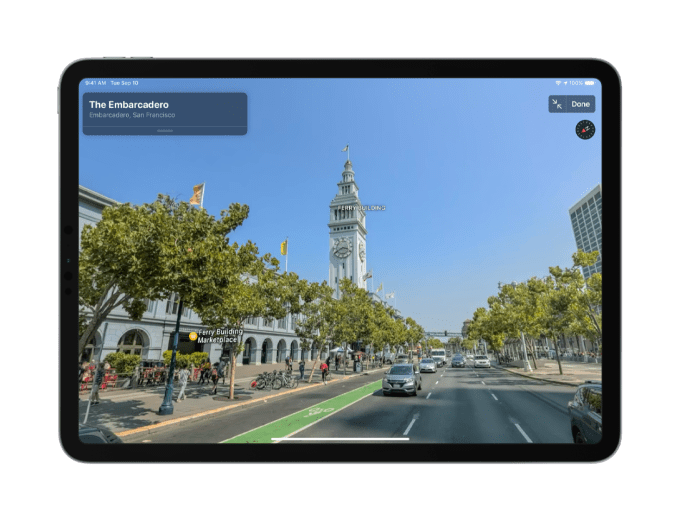
Apple’s updated and more detailed Maps experience has now rolled out across the U.S. The redesigned app includes more accurate information overall as well as comprehensive views of roads, buildings, parks, airports, malls and other public places. It will also bring Look Around to more cities and real-time transit to Miami. These updates are years in the making, following Maps’ initial poor reception and Apple’s subsequent apology and dedication to finally getting it right. Unfortunately, Look Around isn’t as ubiquitous as Google Street View, so if you’re lacking street-level imagery, you may need to switch apps.
Justin O’Beirne has meticulously detailed what these changes look like across cities across the country. It’s impressive.
Sports betting apps spike as Super Bowl approaches
According to App Annie, FanDuel Sportsbook was the No. 1 sports betting app on iOS in the U.S. during the week of Jan 19, 2020. On Jan 23, the app ranked third for daily iPhone downloads among Sports apps in the U.S. — its highest daily rank in the last 365 days. During the last Super Bowl, FanDuel Sportsbook hit No. 6 by iPhone downloads among Sports apps on Feb 3, 2019, up 44 places from the Sunday prior. App Annie predicts it will set new records this year.
Fundings and M&A
- Mobile messaging startup Attentive raises $70M to help businesses reach customers
- GoDaddy acquires social content startup Over to reach the world of entrepreneurs who may never have a website
- Kidtech startup SuperAwesome raises $17M, including from strategic investor Microsoft, to bring kid-friendly tech to apps and websites
- Bird acquired Berlin scooter rival Circ. According to Apptopia, Circ’s app launched in January 2019 and has been installed about 3.7 million times to date
Downloads
Fantastical 3
The best calendar app, Fantastical, got even better this week, with a huge update that brings feature parity across platforms, a new design, AccuWeather integration, Calendar sets, meeting proposals, better tasks integration, one-click Zoom or Hangouts meetings, and more. It also for the first time has moved away from being a one-time purchase to the subscription model — a move that makes sense given the amount of time, care and energy Flexibits spends on upgrades.
DoubleTake

A new free app called DoubleTake lets you capture video from two cameras on select devices, including the iPhone 11 Pro Max, 11 Pro, 11, Xs Max, Xs and Xr. Using the viewfinder, you use DoubleTake’s picker view to visualize all the available cameras for your device (i.e. Ultra Wide, Wide, Telephoto, and Selfie). The app is meant to give users a look at the multi-cam capabilities that are soon coming to Filmic Pro, the company’s feature-rich paid app.
A new Scrabble game

Two years in the making, L.A.-based Scopely launched a new Scrabble game this week, with EA helping to move players over thanks to a partnership. The new game, Scrabble Go, includes social features, regional tournaments, daily and weekly events, leaderboards, a dueling feature with time limits and a matchmaking system to pair similarly-skilled players.
Tangi
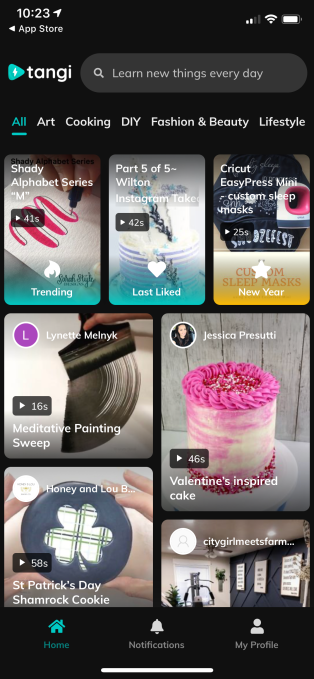 This experimental app from Google’s in-house incubator Area 120 is like a TikTok for DIYers, chefs and crafters.
This experimental app from Google’s in-house incubator Area 120 is like a TikTok for DIYers, chefs and crafters.
If it takes off, it’s proof that TikTok isn’t just a social phenomenon on its own, but is actually inspiring a range of similarly-designed short-form video apps that uses its same UI/UX techniques the way Snap inspired Stories adoption or Tinder inspired swipe-based dating.
See for example —
Voisey, the TikTok for music creation; Triller, the TikTok for music discovery; Lasso, the TikTok from Facebook; Cheez, the TikTok for humor, not to mention Tencent-backed top grosser Kwai and creation plus community apps like Vigo Video, Likee, Funimate and Dubsmash, among others.
Download Tangi here.
Tweet(s) of the Week
We couldn’t limit ourselves to one tweet this time.
News Corp this week introduced its new news platform, Knewz, which is bad. Like, don’t look directly at it, or you may go blind bad. It’s also available as a mobile app.
Twitter, as expected, had a field day with this.